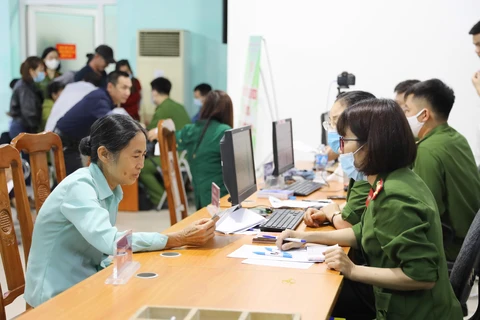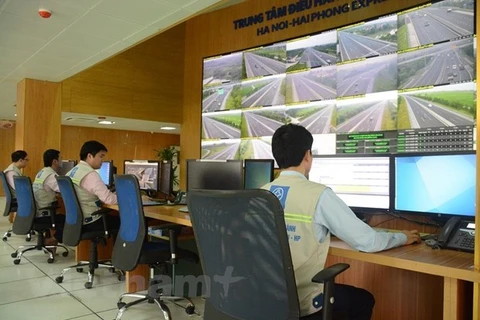 Vice Chairman of the Hanoi People's Committee Ha Minh Hai talks to a women at an unit for receiving, processing, and returning administrative documents in Quang An ward, Tay Ho district, Hanoi. (Photo: VNA)
Vice Chairman of the Hanoi People's Committee Ha Minh Hai talks to a women at an unit for receiving, processing, and returning administrative documents in Quang An ward, Tay Ho district, Hanoi. (Photo: VNA) At a parking lot in Tay Ho Temple in Tay Ho district, vehicles with sticker codes on them can enter and exit through automatic barriers. Moreover, cashless payments are used exclusively, providing residents with quick, convenient, and time-saving services at transparent prices as regulated by the Hanoi People's Committee.
For enterprises, these activities contribute to reducing frauds and losses, direct labour costs, and indirect cash-related management expenses. For state management agencies, the model is helping increase the efficiency of tax management and meet digital transformation requirements.
Similarly, at a unit for receiving, processing, and returning administrative documents in Quang An ward in the district, within just 20 minutes, many administrative documents such as birth registration, permanent residency registration, death registration, and health insurance cards have been processed rapidly.
According to Vice Chairwoman of the Tay Ho disrtrict People’s Committee Bui Thi Lan Phuong, administrative reform and digital transformation have fundamentally changed the old way of working, simplifying the handling of administrative procedures, and helping increase transparency and openness.
According to a report from the municipal People's Committee, to maximise support for citizens and businesses in carrying out online public services, Hanoi is the first locality in the country to issue a resolution stipulating a free fee for online public services.
In particular, municipal officials have fully implemented digital signatures on a shared software system called the Information and Reporting System, Document Management and Administration System. Up to 100% of state agencies in the capital city have deployed digital signatures on the system. The city's three-tier administrative settlement information system is connected to the central level.
These have laid a vital foundation to deploy online public services serving people and businesses, thereby promoting the development of digital government, digital economy, and digital society in the capital city.
With great determination and efforts of state agencies, organisations, businesses, and residents in accelerating digital transformation, Hanoi is expected to become a modern and smart city integrated into the network of smart urban cities in the region and the world by 2030./.
VNA
























